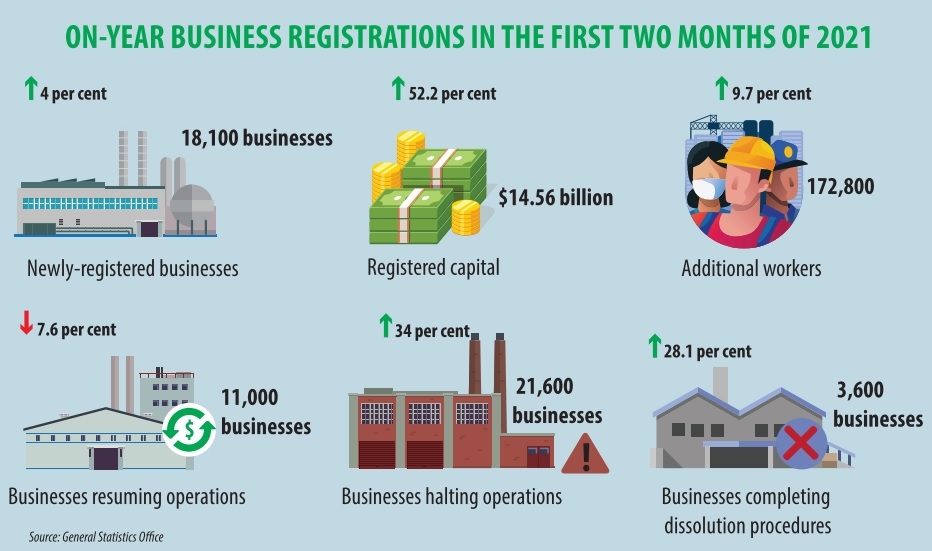Another support package to accelerate business rebound
 |
Last May, Hoang Ngoc Kien, director of Hoang Ngoc Trading JSC, halted the operation of his rice processing mill at Quang Minh Industrial Park (IP) in Hanoi’s Dong Anh district due to COVID-19. The factory was opened in 2015 and is the second company constructed in the city since 2014.
Last June the first mill, also based at the park, faced the same issues. However, since this January both mills have resumed operations and some large contracts have been landed with several domestic and foreign businesses at Quang Minh IP and the nearby Thang Long IP. As a result, 300 workers have enjoyed returning incomes.
“We are happy that our two mills are in full operation now,” Kien told VIR. “Three Japanese companies employing nearly 1,000 workers at Thang Long IP also decided to buy rice from our company.”
The company is one of more than 11,000 enterprises resuming operations in the first two months.
“The two-month socioeconomic situation continued showing encouraging signals, with the confidence of the business community growing stronger,” stated Prime Minister Nguyen Xuan Phuc at last week’s cabinet meeting on the economy’s performance. “This will contribute to the government’s economic growth target of 6.5 per cent this year.”
According to the General Statistics Office (GSO), in the first two months of 2021, the economy saw 18,100 newly-established enterprises with the total registered capital of VND334.8 trillion ($14.56 billion), employing 172,800 labourers – up 4 per cent in the number of enterprises, 52.2 per cent in capital, and 9.7 per cent in labourers against the same period of last year.
The average registered capital of each newly-established business in the first two months was VND18.5 billion ($804,000), up 46.4 per cent on-year. If an additional VND385.6 trillion ($16.76 billion) registered by 6,500 operational enterprises is included, a total of VND720.4 trillion ($31.32 billion) was registered in the first two months.
“These are very positive signals for the economy as the pandemic remains very complicated, badly affecting enterprises’ business, and production activities,” said a GSO report on the economy for the year so far.
New support packages required
However, PM Phuc noted that despite the economy gradually bouncing back and businesses recovering, further support from the government is extremely necessary.
“Authorised agencies and ministries need to review and adjust existing support packages for enterprises. A second package must be designed and proposed to the government to help businesses out of difficulties as soon as possible,” PM Phuc stressed.
Since the second quarter of 2020, the government has been deploying drastic measures to support businesses. For example, the State Bank of Vietnam unveiled a package worth VND180 trillion ($7.82 billion) for enterprises and households, in the form of debt payment deferrals and preferential loans.
Do Van Sinh, member of the National Assembly Economic Committee, told VIR that a new economic stimulus package is “quite necessary, given enterprises are facing massive difficulties.” However, for the package to be materialised, he said a close look is necessary at the existing state budget situation. Last year, Vietnam suffered a total budget deficit of VND273 trillion ($11.87 billion).
“Thus, if another economic stimulus package is enacted, how much will it be, especially given the numerous difficulties in the state budget? I think it is necessary to first carry out the existing packages effectively,” Sinh said.
Meanwhile, National Assembly deputy Truong Minh Hoang, representing the southernmost province of Ca Mau, also told VIR, “It is necessary to have a new economic stimulus package to further support enterprises. Thorough studies must be made to decide what sectors and who will benefit from the new package,” he said. “It is urgent to provide more support to enterprises.”
Suggestions
Commenting on the need for the new support packages, Raymond Mallon, an Australian economist based in Hanoi since 1991, told VIR that an important aim of government support measures should be to stimulate increased domestic consumption and employment because this will improve social wellbeing while also helping stimulate overall domestic demand for goods and services provided by businesses.
“There is also scope for temporarily targeting support to workers and businesses in locations and sectors worst affected by COVID-19 such as those working in the hospitality and other close contact businesses, especially in regions with high concentrations of adversely impacted businesses such as the central coastal provinces,” he said.
According to Mallon, temporary support may be needed for firms adversely impacted by COVID-19 that are providing essential services to society and businesses, such as health, education, transport, and logistics services. It is important to have clear and simple criteria for eligible businesses to ensure that those most in need receive the support and to minimise opportunities for corruption.
“There may also be opportunities to support businesses and groups that will need to change or adapt business and employment strategies. For example, there may be a case for government support to facilitate shifts to the e-commerce and online provision of education and health services,” Mallon said. “The key is to design support that encourages adaptation to new opportunities, rather than simply helping businesses to survive if they are unlikely to be viable in the medium term. Transparency in the provision of such support will be essential to ensure that support reaches those most in need of support and not just the most well connected.”
The International Monetary Fund last week released a report on Vietnam’s economy, predicting that it will grow 6.5 per cent this year. However, it also proposed a number of solutions for the government to fuel the economy and support businesses amid difficulties (see box).
As for businesspeople like Kien of Hoang Ngoc Trading JSC, he said that she expected the new support packages from the government to be materialised via specific solutions and programmes.
“The economy is recovering and we hope the solutions will continue helping businesses like us to not only stay afloat but also weather all difficulties,” Tuat said. “In the first support package from the government, we had access to preferential loans from the Vietnam Bank for Social Policies (VBSP) at zero lending rate.”
Under the first support package, the VBSP has offered a VND16 trillion ($695.65 million) credit package to businesses that want to seek preferential loans at a zero lending rate to pay salaries for their employees.
| Recommendations from the International Monetary Fund Given Vietnam’s successful containment of COVID-19, the near term policy imperative is to limit permanent scarring and support a robust recovery. Over time, policies should centre around achieving sustained, inclusive, and greener growth. - Provide fiscal support and improve execution: Available fiscal space should be flexibly deployed to support vulnerable households and distressed, but viable businesses, with improvement of execution as a priority. Fiscal support should remain in place until the recovery is cemented, with the emphasis thereafter pivoting to revenue mobilisation for financing productive and green infrastructure investment and strengthening social protection systems. - Maintain monetary support and modernise the policy framework: Monetary policy should remain supportive, while allowing for greater two-way exchange rate flexibility. Reforms to modernise the monetary policy framework and improve policy transmission should continue. - Safeguard financial stability: The corporate sector support should be targeted and time bound, and debt restructuring mechanisms strengthened. Exceptional policy support should be gradually phased out and financial stability risks closely monitored. Fragilities in the banking system should be addressed, including rebuilding capital buffers and facilitating Basel II standards adoption once the crisis abates. - Boost productivity and lift growth potential: Decisive structural reforms are needed to make the most of Vietnam’s considerable potential, with priority given to ensuring a level playing field for small- and medium-sized enterprises, while lowering the regulatory burden and reducing corruption, alleviating labour skill mismatches, and tackling informality. |
Nguyen Hoai Nam - Deputy general secretary, Vietnam Association of Seafood Exporters and Producers
 |
Most seafood processing businesses are located in major economic areas for shrimp farming like Ca Mau, Bac Lieu, and Soc Trang where tax was increased from 5-10 to the maximum 20 per cent in 2020.
We propose ministries to make all food processing stages eligible for the preferential corporate income tax under Circular No.26/2015/TT-BTC.
While some taxes and fees have been delayed or removed, businesses still have to pay union fees. We hope that the Ministry of Planning and Investment will propose cancelling these fees for 2021.
The Law on Environmental Protection has also just been adopted. However, 80 per cent of seafood processing businesses cannot keep the phosphorus concentration under the required level. A violating business could lose all of its contracts immediately. The laws should be adjusted to local businesses’ capabilities to help them compete with other exporters. If the government tightens standards for phosphorus concentration for all processing and manufacturing, seafood processing will die.
Phan Minh Tam - Chairman, Simple Tech Investment
 |
The pandemic has been a great challenge to businesses, with many weaker ones struggling and even going under. The more businesses go down, the weaker the economy and the private sector become, so more government help is needed. For example, the bailout or support of the government to small- and medium-sized enterprises should be based on their contribution in the past years.
However, the pandemic was a good time to change business thinking. Vietnam is enjoying favourable conditions thanks to successfully fighting against COVID-19. However, vaccines are being traded widely and the countries that are vaccinated first will succeed first.
Most foreign-invested projects were the outcomes of research and discussions before COVID-19, and some smaller deals were made online. To welcome foreign investors and experts as soon as possible, we should introduce specific policies to receive them, especially those who have been vaccinated, instead of approving them on a case-by-case basis.
Nguyen Hung Cuong - Representative, FPT Group
 |
FPT Group is present in 26 countries and territories, and we keep up-to-date on the COVID-19 situation every day. We can see the risks of economic depression everywhere. However, the pandemic has provided a huge chance for digital transformation. Businesses that had never thought of going digital before are now starting to do so, along with supply chains.
We see a lot of opportunities for local businesses, IT ones in particular. For example, this year’s World Economic Forum will be held in Singapore, signifying interest in Southeast Asia. Learning from more-developing neighbours, we should improve and advertise Vietnam a lot more as the hub of the region, the centre of developing IT, and innovation to attract more high-tech foreign investors and projects. However, we need policies to welcome foreign businesses, especially those from nations ahead with COVID-19 vaccination.
Some partners of FPT from Malaysia, Hong Kong, and Singapore are paying attention to Vietnam and there will be numerous opportunities once international flights and borders are reopened.
Trinh Thi Ngan - Representative, Hanoi SME Association
 |
The pandemic has burned reserve funds and exhausted all the efforts of small- and medium-sized enterprises (SMEs). In 2021, businesses in tourism, hotels, and aviation have been frozen. SMEs’ output plummetted, along with consumption. Export markets like the United States, Europe, Japan, and South Korea all cut orders. For example, partners cancelled or delayed receiving large batches from Garment 10. This freezes a large amount of the working capital of SMEs, as the demand for non-essential products have gone down.
Therefore, we hope the bailout and support policies from last year will be maintained. We also propose cutting down or exempting rent for hospitality businesses. Despite Decree No.111/2015/ND-CP on the development of supporting industries, and even with the recent policies from the Ministry of Finance, there remain a lot of challenges. In addition to extending deadlines for tax and land rental payments, we propose to lower mid- and long-term loan interest rates and loosen loan terms because all the requirements, such as asset collateral, are now too challenging for SMEs.
Vu The Binh - Vice chairman, Vietnam Tourism Association
 |
Before the pandemic, there were 40,000 tourism enterprises, using 2.5 million employees. And there were 2,500 travel-based businesses, nearly 600 of which collapsed and most others having to suspend operations.
Last year, the government provided a lot of solutions and policies to support enterprises and tourism ones in particular. However, the performance of the implementation has not been as good as the policies, due to apathetic people making it more difficult.
Very few businesses could borrow money or receive assistance from the government’s bailout. They have done it themselves by the combination among travel, hotel, restaurant, and airline enterprises to build ever super-cheap combo tours to overcome difficulties.
We propose the government to retain the support they provided in 2020, as well as add more for tourism businesses. For example, loosening provisions and conditions on loans for labour wage payment, exempting or delaying insurance fees, and reducing electricity bills.
What the stars mean:
★ Poor ★ ★ Promising ★★★ Good ★★★★ Very good ★★★★★ Exceptional
Related Contents
Latest News
More News
- VNPAY and NAPAS deepen cooperation on digital payments (February 11, 2026 | 18:21)
- Vietnam financial markets on the rise amid tailwinds (February 11, 2026 | 11:41)
- New tax incentives to benefit startups and SMEs (February 09, 2026 | 17:27)
- VIFC launches aviation finance hub to tap regional market growth (February 06, 2026 | 13:27)
- Vietnam records solid FDI performance in January (February 05, 2026 | 17:11)
- Manufacturing growth remains solid in early 2026 (February 02, 2026 | 15:28)
- EU and Vietnam elevate relations to a comprehensive strategic partnership (January 29, 2026 | 15:22)
- Vietnam to lead trade growth in ASEAN (January 29, 2026 | 15:08)
- Japanese business outlook in Vietnam turns more optimistic (January 28, 2026 | 09:54)
- Foreign leaders extend congratulations to Party General Secretary To Lam (January 25, 2026 | 10:01)

 Tag:
Tag:




















 Mobile Version
Mobile Version